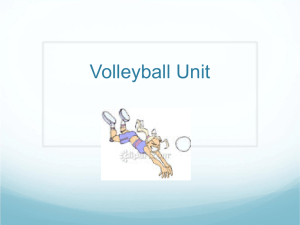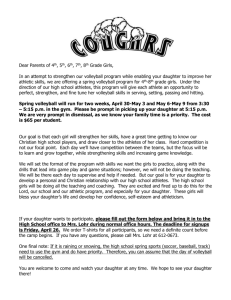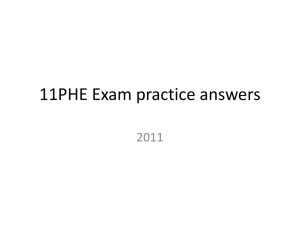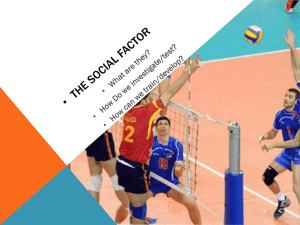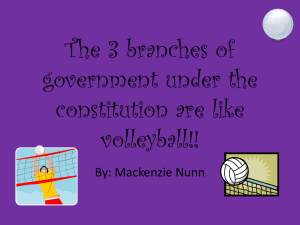Unit Plan Template
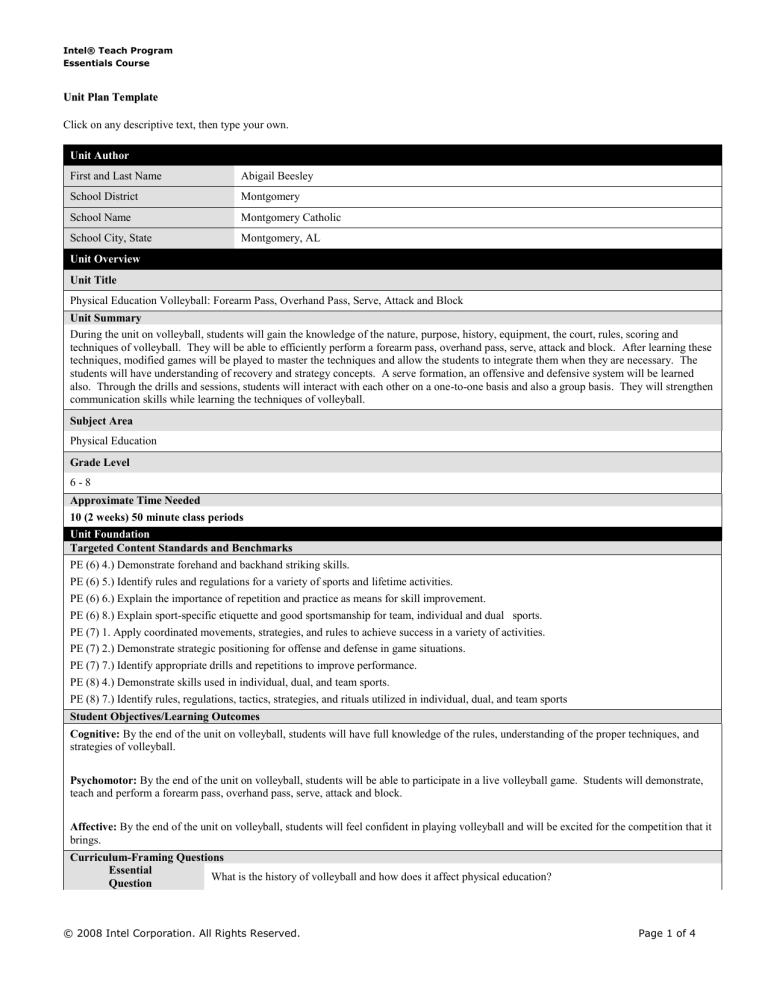
Intel® Teach Program
Essentials Course
U n i i t t P l l a n T e m p l l a t t e
Click on any descriptive text, then type your own.
Unit Author
First and Last Name Abigail Beesley
School District
School Name
Montgomery
Montgomery Catholic
School City, State
Unit Overview
Montgomery, AL
Unit Title
Physical Education Volleyball: Forearm Pass, Overhand Pass, Serve, Attack and Block
Unit Summary
During the unit on volleyball, students will gain the knowledge of the nature, purpose, history, equipment, the court, rules, scoring and techniques of volleyball. They will be able to efficiently perform a forearm pass, overhand pass, serve, attack and block. After learning these techniques, modified games will be played to master the techniques and allow the students to integrate them when they are necessary. The students will have understanding of recovery and strategy concepts. A serve formation, an offensive and defensive system will be learned also. Through the drills and sessions, students will interact with each other on a one-to-one basis and also a group basis. They will strengthen communication skills while learning the techniques of volleyball.
Subject Area
Physical Education
Grade Level
6 - 8
Approximate Time Needed
10 (2 weeks) 50 minute class periods
Unit Foundation
Targeted Content Standards and Benchmarks
PE (6) 4.) Demonstrate forehand and backhand striking skills.
PE (6) 5.) Identify rules and regulations for a variety of sports and lifetime activities.
PE (6) 6.) Explain the importance of repetition and practice as means for skill improvement.
PE (6) 8.) Explain sport-specific etiquette and good sportsmanship for team, individual and dual sports.
PE (7) 1. Apply coordinated movements, strategies, and rules to achieve success in a variety of activities.
PE (7) 2.) Demonstrate strategic positioning for offense and defense in game situations.
PE (7) 7.) Identify appropriate drills and repetitions to improve performance.
PE (8) 4.) Demonstrate skills used in individual, dual, and team sports.
PE (8) 7.) Identify rules, regulations, tactics, strategies, and rituals utilized in individual, dual, and team sports
Student Objectives/Learning Outcomes
Cognitive: By the end of the unit on volleyball, students will have full knowledge of the rules, understanding of the proper techniques, and strategies of volleyball.
Psychomotor: By the end of the unit on volleyball, students will be able to participate in a live volleyball game. Students will demonstrate, teach and perform a forearm pass, overhand pass, serve, attack and block.
Affective: By the end of the unit on volleyball, students will feel confident in playing volleyball and will be excited for the competition that it brings.
Curriculum-Framing Questions
Essential
What is the history of volleyball and how does it affect physical education?
Question
© 2008 Intel Corporation. All Rights Reserved. Page 1 of 4
Intel® Teach Program
Essentials Course
Unit Questions
Content
Questions
Assessment Plan
Assessment Timeline
What are the important strategies used in volleyball? How do these strategies incorporate teamwork and knowledge of the forearm pass, overhand pass, serve, attack and block?
What are the techniques of the forearm pass, overhand pass, serve, attack and block?
Before project work begins After project work is completed
Pre-test
Handouts (the court)
Notes (history, equipment, rules, scoring)
Students work on projects and complete tasks
Movement skills
Forearm pass
Overhand pass
Serve
Attack
Block
Modified games
PowerPoint
Post test
Skills test
Assessment Summary
During the unit, students will receive instruction in the classroom and on the court. Visual and hands-on learning will engage in everyone’s learning realm. Handouts will be given out to learn the techniques and the steps taken to perform them. Once the skills are learned, students will perform a skills test to see their status. At the end of the unit on volleyball, students will be required to make a PowerPoint slide on the techniques of forearm pass, overhand pass, serve, attack and block. Groups of 4 students will be made. Minimum of 7 slides. The
PowerPoint should include: the first slide should be labeled with your group names and the second slide should include a brief history of volleyball. The technique slides should include: Nicknames of the techniques (Forearm pass – dig pass – bump pass), the way(s) the skill is used on the court, for example the forearm pass is used to receive low, hard-driven balls approaching at waist height or lower. The pass is used to receive the serve, free balls, off-speed spikes, and sometimes, to set a ball to the attacker. Skillful use of the forearm pass made obvious its use for playing balls extremely close to the floor. Going for these low balls became known as "digging the ball out," giving rise to the term
"dig.") and steps to performing the skill. The students will also complete a crossword puzzle.
Day 1: Introduction and Basic Rules
Students will learn the nature and purpose of volleyball. They will be taught the history of volleyball. They will be introduced to the equipment, the court and the basic rules. A short introduction training session to pre-test of the forearm pass, overhand pass, serve, attack and block will be administered.
Day 2: Fundamental Skills
Students will learn more basic rules to volleyball and the scoring procedures. Movement skills will be taught such as low position and medium position. The shuffle step and forward/backward movement will be taught for the low position, and the shuffle step, run lateral/forward, and backpedal movements will be taught for medium position. The PowerPoint assignment rubric and instructions will be given.
Day 3: Forearm Pass
Students will learn the forearm pass. Serve reception, free-ball pass, side to target and back to target will be taught.
Day 4: Overhand Pass
Students will learn the overhand pass. Set forward and free-ball pass will be taught. The forearm pass will be incorporated into drills so the
© 2008 Intel Corporation. All Rights Reserved. Page 2 of 4
Intel® Teach Program
Essentials Course student will progress smoothly.
Day 5: Serve
Students will learn how to serve in volleyball. They will learn two variations: underhand and overhand floater. The forearm pass, overhand pass and serve will be incorporated in drills also.
Day 6: Attack and Block
Students will learn how to attack and spike the ball. Students will learn the spike roll and spike. Students will learn how to block an attack or pass. Students will learn the strategies and techniques about blocking for offensive and defensive play. The forearm pass, overhand pass, serve and attack will be incorporated in drills also.
Day 7: Modified Games
Students will play modified games. 1 on 1, 2 on 2, 3 on 3. They will use a small court- ½ wide front court. The serve will be tossed in the air.
Various types on contact will be used: forearm pass, overhand pass, serve, attack and block. A crossword puzzle will be given for the students to complete.
Day 8: Modified Games
Students will play modified games. 1 on 1, 2 on 2, 3 on 3. They will use a small court- ½ wide front courts. The serve will be tossed in the air. Various types on contact will be used: forearm pass, overhand pass, serve, attack and block.
Day 9: Strategies and Systems
Students will learn strategies: three contacts, make opponents play the ball, and serve in court 80-90 percent of the time. Three contact points are passing to center front, set to left front and spike roll/spike. Five-person, “W” serve reception pattern, free-ball defense and 6-6 pr 4-2 offense.
Day 10
The pre-test, now post-test, will be administered. Content knowledge and skill based. A skills test of the forearm pass, overhand pass, serve, attack and block will be administered.
Unit Details
Prerequisite Skills
To begin the unit, students need to have good communication skills and the motivation to learn a new sport and techniques.
Communication in learning a new sport helps to engage learning with all students and allows for a better understanding of the sport. Good physical condition of the students is needed. Students should not be injured or sick.
Instructional Procedures
Classroom
When students are instructed to be in the classroom, they will enter the room quietly and wait for lecture to start. If they have any questions, they should always raise their hand. Handouts and drawings will be used frequently so pencil and paper is needed each class period. These materials will help them with the PowerPoint presentation and crossword puzzle.
Court
To start off a session, running, stretching, sprinting and jumping will be performed. Depending on the training session, demonstration and instruction will start a new skill. Students should bring the notes taken during the classroom session so they are able to review over them after demonstration. Drills will be performed for repetition. Match play will also be performed.
Accommodations for Differentiated Instruction
Special Needs
Students
Nonnative Speakers
Students with special needs can participate in sitting volleyball which allows those who are of a minor disability to participate in an activity with those are more severely handicapped, which creates an environment based on equality and love of the sport rather than severity of diseases. With no expensive equipment or wheelchair modification, sitting volleyball is truly available to all members of the disabled community. Different types of balls, net sizes and court sizes can be made to accommodate students.
For nonnative speakers, I will use visual demonstrations and use handouts with their language and demonstrations on them. I will practice their language and try to get the basics of their language down. This will allow them to have a basis and try to work through conversation with me. I will try to speak clearly and pronounce your words correctly, recognize that people wrongly think that turning up the volume somehow creates instant understanding, avoid running words together and avoid using contractions or short forms.
© 2008 Intel Corporation. All Rights Reserved. Page 3 of 4
Intel® Teach Program
Essentials Course
Gifted/Talented
Students
Internet Resources
For gifted/talented students, they will be allowed to pick up equipment while other students are still performing the tasks. If the student cannot comprehend the technique taught that day then I will have a video of volleyball or handouts for them to look over and complete.
Materials and Resources Required For Unit
Technology – Hardware (Click boxes of all equipment needed)
Camera Laser Disk
Computer(s)
Digital Camera
Printer
Projection System
DVD Player
Internet Connection
Scanner
Television
Technology – Software (Click boxes of all software needed.)
Database/Spreadsheet Image Processing
Desktop Publishing
E-mail Software
Encyclopedia on CD-ROM
Internet Web Browser
Multimedia
Printed Materials
Syllabus, diagrams of skills and techniques and rules
VCR
Video Camera
Video Conferencing Equip.
Other: Smartboard
Web Page Development
Word Processing
Other
Supplies
Volleyballs, cones, net, and court http://usavolleyball.org/
Other Resources
Rally - Germany vs. Bulgaria
Italy vs. Japan 2012
Passing Technique
Serving Technique
Blocking Technique
Copyright © 2008 Intel Corporation. All rights reserved. Intel, the Intel logo, Intel Education Initiative, and Intel Teach Program are trademarks of Intel Corporation in the U.S. and other countries. *Other names and brands may be claimed as the property of others.
© 2008 Intel Corporation. All Rights Reserved. Page 4 of 4

